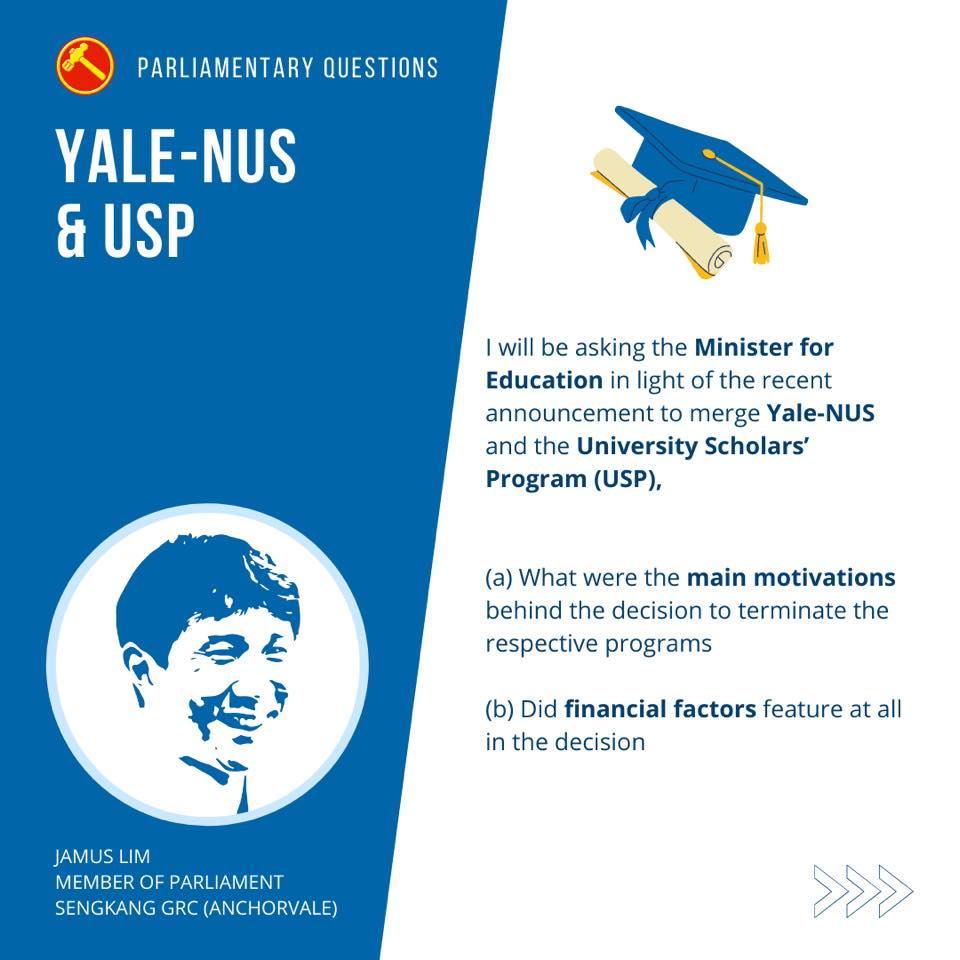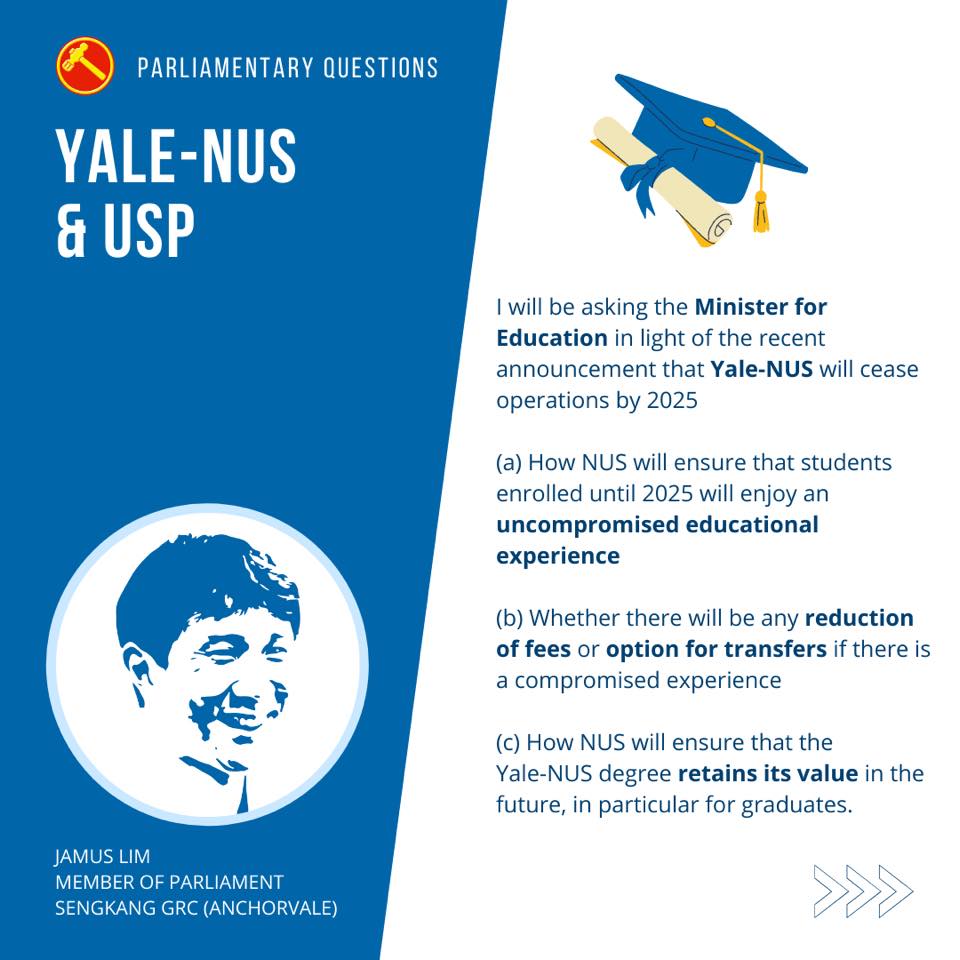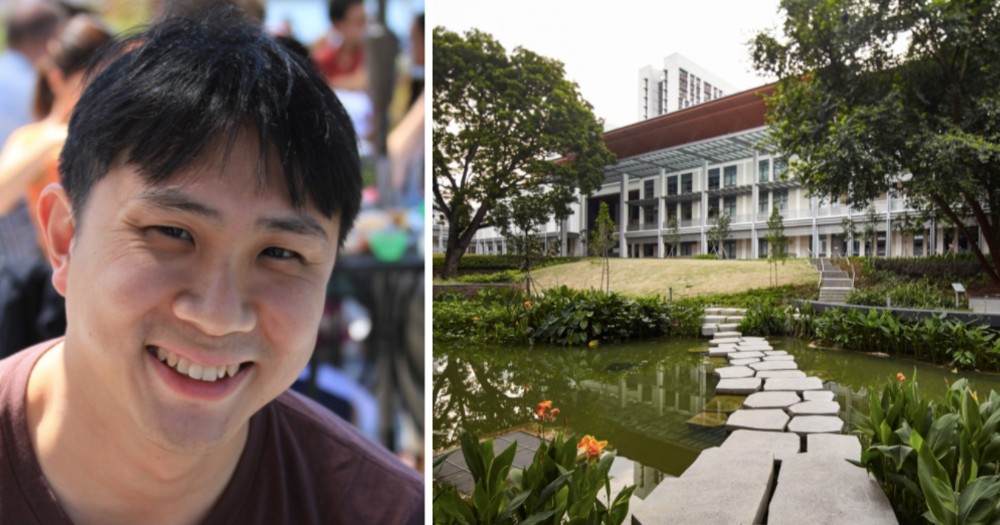Follow us on Telegram for the latest updates: https://t.me/mothershipsg
Workers' Party Member of Parliament Jamus Lim will submit parliamentary questions on the intended Yale-NUS and University Scholars Programme (USP) merger, he announced over Facebook on Wednesday (Sep. 1).
Lim, an MP of Sengkang GRC, will also be posing questions about the announcement that Yale-NUS will cease operations in 2025.
To ask whether the student body should have been consulted over decision
In his post, Lim shared the parliamentary questions he intends to ask the Minister of Education.
 Image via Jamus Lim/FB.
Image via Jamus Lim/FB.
 Image via Jamus Lim/FB.
Image via Jamus Lim/FB.
Lim also intends to ask whether, or why wasn't, the faculty or student body consulted over the decision to merge the schools.
Yale-NUS student publication The Octant reported that Tan Tai Yong, President of Yale-NUS College, was not consulted over the decision.
Tan said that "the decision was made jointly by Yale and NUS, and the news came to him as a fait accompli".
He also intends to ask how NUS would ensure that Yale-NUS students enrolled until 2025 would receive an uncompromised education experience.
The issue of consultation has been one of the key points raised by students following news of the mergers.
A petition titled "NUS – Reverse the Mergers and #NoMoreTopDown" has garnered over 11,000 signatures.
The mergers cited include the Yale-NUS and the University Scholars Programme merger, the merger of the Faculty of Arts and Social Sciences and the Faculty of Science, as well as the merger of the Faculty of Engineering and the School of Design and Environment.
The petition also called for the creation of policies "based on the close participation and consent of students, staff, and representatives in common agreement and for their collective wellbeing".
Closure of Yale-NUS "regrettable"
In his post, Lim said that Yale-NUS represents "a tiny beacon of diversity in local education" and its closure would mean that Singapore will have "one less avenue for informed debate".
Although he suspects that most Singaporeans are apathetic about the proposed closure of Yale-NUS, he explains in his post why "small liberal arts colleges", like Yale-NUS, are valuable for cultivating creativity and a love for learning.
As an educator himself, who taught at a liberal arts college for a year, Lim said that he has an "inherent interest" in the issue, and finds "the loss of Yale-NUS regrettable".
Liberal arts education not "inherently left-leaning"
Lim explained that events such as having Alfian Sa'at's class on dissent and resistance cancelled before the course was set to take place, have led some to think that the college was a breeding ground for "dissident, far-left thinking".
He defended liberal arts education, saying that it is inaccurate to think that such an education is "useless or inherently left-leaning".
Lim said that liberal arts is just as much about the method of instruction, as the curriculum itself.
According to Lim, liberal arts makes use of "a multidisciplinary framework and critical thinking" to guide its approach to education, and that it does not "exclusively teach modernist leftist ideas".
Lim hopes that his, and his party members', parliamentary questions will help shed more light behind the decision-making process behind Yale-NUS' closure.
Read his post in full here:
Fellow Sengkang GRC MP He Ting Ru also posted Parliamentary Questions on the merger.Leon Perera, one of the MPs for Aljunied GRC, also filed the following Parliamentary Question for the sitting on September 13."In my PQs, I am asking for clarity. Many have shared that they feel this is a top-down decision that left them feeling lost, confused, disgruntled and seeking answers."
6. To ask the Minister for Education, in relation to the recently announced plans for Yale-NUS College to close:
a) what were the KPIs of NUS and MOE vis-a-vis Yale-NUS and what was assessed to be the performance on those metrics;
b) what has been the impact of Yale NUS on the quality and quantity of admissions to NUS;
c) are there any plans for a dedicated liberal arts college going forward;
d) does the government plan to take any new steps to manage the impact of this episode on Singapore’s reputation for quality tertiary education partnerships with overseas institutions; and
e) did the nature of student activism on the Yale-NUS campus play any part in the decision.
Follow and listen to our podcast here
Top photos via Jamus Lim/FB and Yale-NUS/FB
If you like what you read, follow us on Facebook, Instagram, Twitter and Telegram to get the latest updates.
